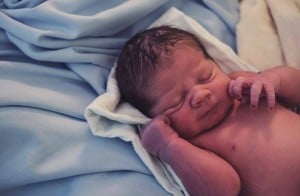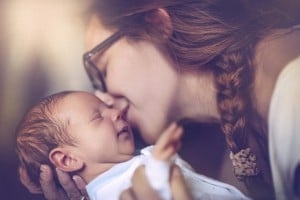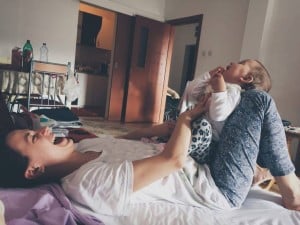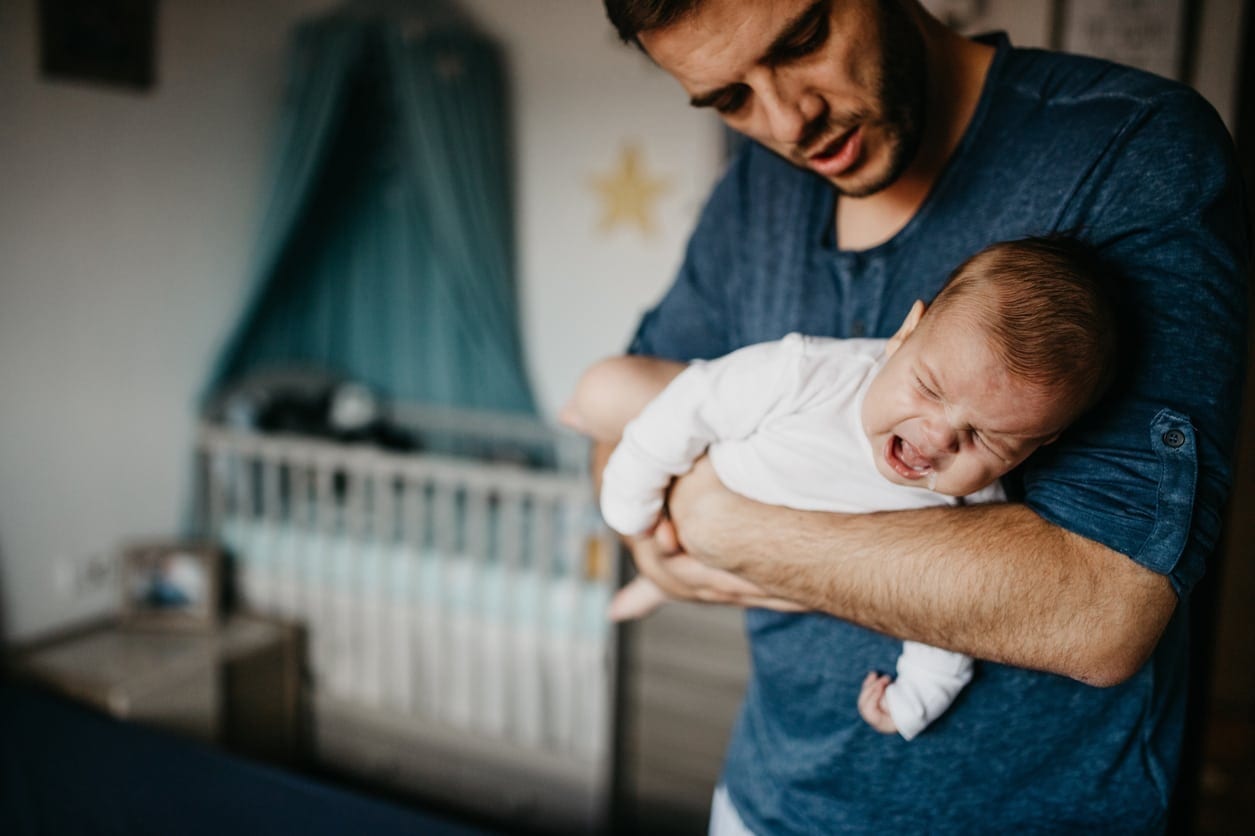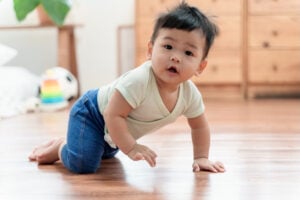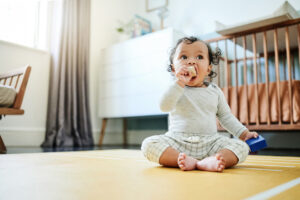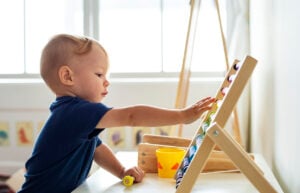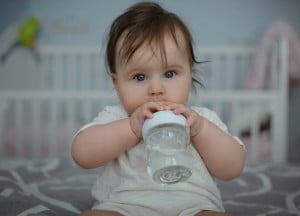When a baby gets dropped and hits the floor, it’s scary! It doesn’t matter if baby rolled or fell off the bed, couch, or changing table or somehow did a nosedive right out of your arms. Most of the time, your first reaction is to panic. Don’t worry; it’s usually harder on you than your baby. This happens more often than you might think. According to the Centers for Disease Control and Prevention (CDC), falls in babies and children are one of the leading causes of unintentional childhood injuries. Babies are very bouncy (thank goodness!), which helps tremendously when a baby gets dropped by accident or falls on their own.1,7
Babies typically start to roll over around 4 months of age. Before that, they can still reflexively move, kick, and push on things with their feet and legs. This may result in a fall! So, it’s essential to always keep one hand on your baby when they’re on a bed, couch, etc. This will help prevent baby from rolling off. If you can’t keep one hand on them, move them to a safe place like a crib or playpen.2 But if they do end up falling, it’s important to know what to check your baby for.
What To Do If Your Baby Falls off the Bed
Many parents have had an experience where their baby fell or rolled off a bed, couch, or changing table and hit the floor. The good news is that most of these falls only result in minor injuries, not major ones.3,5 So, what should you do first? I know it sounds ridiculous to even say, but you need to take a deep breath and remain calm. If there are no signs of significant injury, pick your baby up and comfort them. You can examine their face and head while holding them. Remember, your baby is most likely crying because they’re scared (you are too, and they can feel that), not because they’re injured. Most babies who fall from a low height (under 4 feet) don’t have serious injuries.
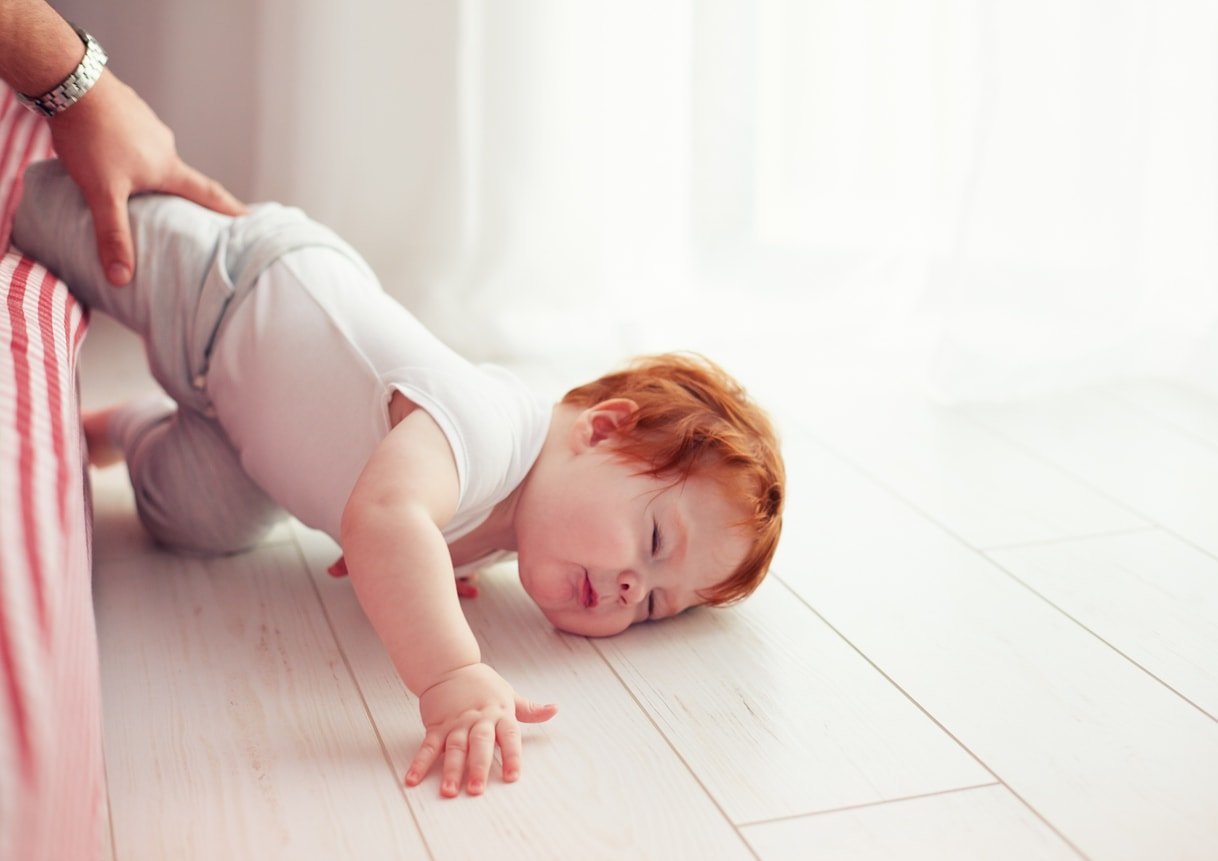
If your baby fell off the bed or couch and hit the floor, but they seem okay, here’s what to do:
1. Check for Injuries
Look for obvious signs of injury in your baby. For instance, check for bleeding, a bump on the head or “goose egg,” red marks on the face, or bleeding from the mouth. If a baby is old enough to have teeth, they often bite their lip or the inside of their mouth when they fall.3,5
2. Provide Comfort and Reassurance
Comfort your baby by holding and cuddling them, which makes them feel safe. If they start to calm down after five minutes or less and begin to act like themselves again within 30 minutes, there are most likely no major injuries.3,5
3. Contact Your Provider
Notify your provider’s office even if you don’t suspect any major injuries. They’ll review what signs to look for in case you forget something and how to treat any bumps or bruises. Most of the time, as they ask you questions about the fall, you’ll realize all the answers are “no” and that your baby is alright. They’ll also explain what to watch for over the next 12 to 24 hours, such as:3,4
- Liquid coming from the ears, specifically blood or clear fluid
- Their eyes making any strange movements (this could indicate seizure activity)
- Baby sleeping more or less than usual
- Balance issues, such as an unsteady gait or crawl that’s different than usual
If your baby is vomiting after each feeding, specifically projectile vomiting (this is vomiting up to 2-3 feet through the air), you need to call their provider immediately.
When Is Your Baby Falling off the Bed an Emergency?
There are also times when it’s more of an emergency if your baby is dropped or falls and their head hits the floor. These accidents are usually from a higher position, such as when you’re holding them in your arms or they fall out of a swing. Baby walkers can also cause an accident where baby’s head hits the floor. Babies have even fallen down the stairs and pulled hot items off the stove and onto themselves with their walkers’ help.14
Usually, your gut will tell you whether it’s an emergency. But here’s a list of signs and symptoms that would indicate an emergency (with an immediate call to the doctor or 911 or a visit to the emergency room):3,6,7,14
- Baby vomits immediately after the fall and continues to vomit
- Baby has lost consciousness or passed out, even for a second
- Any signs of broken bones
- Swelling or bulging at the soft spot on the top of their head
- Their head seems misshapen, or you see a dent in the skull
- Baby has breathing difficulties
- The pupils (black circles) in the eyes are uneven (one pupil is bigger than the other)
- Signs of seizure activity are present
- Bluish color/bruising around both eyes and behind the ears
- Blood or clear fluid coming out of the ears
- Bleeding that won’t stop after five minutes of pressure
- Baby won’t stop crying and hasn’t calmed down after five minutes
Can a Child Sleep After Hitting Their Head?
Maybe you’ve heard that you shouldn’t let your baby fall asleep if they’ve fallen off the bed or couch or were accidentally dropped and hit their head on the floor. But according to Cleveland Clinic, it’s okay to let them sleep.3 An overtired baby can show the same signs and symptoms as a baby with a concussion. For instance, they may be more irritated and cranky than usual and be more sleepy and fussy. So, it’s best to let them sleep if they need to. If baby does go to sleep, you should try to wake them gently after two to three hours to make sure they haven’t passed out or lost consciousness. If they don’t wake up or arouse or seem super fussy, sleepy, or lethargic, you should notify your provider.3
How To Prevent Baby Falls in the Future
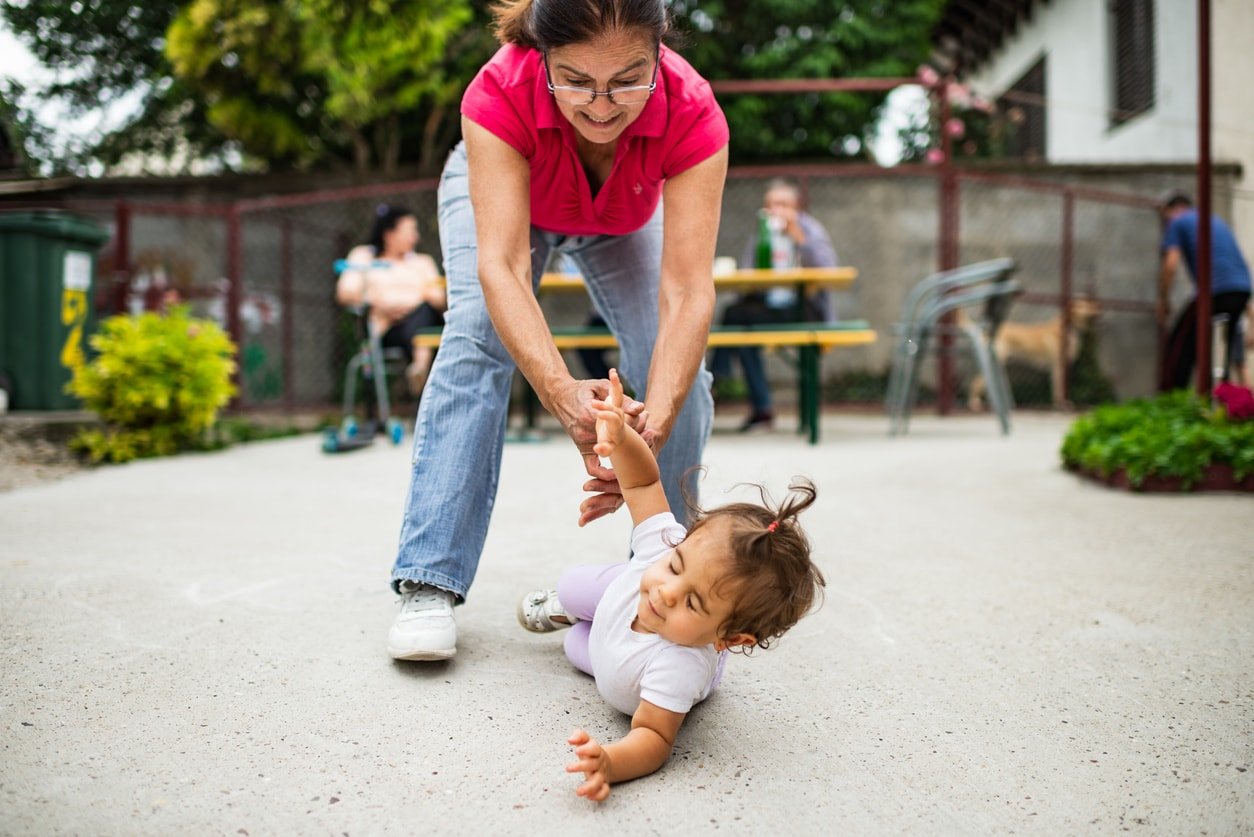
Is there a way to prevent a baby from falling or being dropped? All you can do is try your best because those babies are wiggly, wriggly little humans. The first thing to remember is to never leave your baby alone on anything elevated off the floor, like a couch, bed, or changing table. Another simple safety tip is to block off all entries to stairs. This prevents accidental falls down the steps where you know they’d hit their head.
Also, always use a stationary activity center for your baby instead of a walker to help prevent falls down the stairs. If you put baby on a bed for a nap instead of in a crib or bassinet (which is the best time for you to get some rest, by the way), make sure there’s a pillow or barrier of some kind on both sides of them. Sometimes, they roll faster than you can imagine and might plop onto the floor in the blink of an eye.3,5
Tips for Keeping Baby Safe
As busy parents, we sometimes take shortcuts to make our day a little easier. However, some of these shortcuts can lead to a baby falling and hitting their head on the floor. So, here are a few tips to help keep your baby safe, even if they take a second or two longer in your day:
- Strap them in: Always strap your baby into anything with straps, like highchairs, infant carriers, swings, strollers, shopping carts, etc. Those straps are there for a reason!
- Keep baby off high surfaces: Don’t place car seats or bouncy seats on elevated surfaces like a chair or table. Just put them on the floor to be safe.
- Secure all your furniture: Please take the time to secure furniture such as televisions, bookcases, and dressers to the walls using wall mounts, brackets, anchors, or wall straps. This prevents baby from pulling things over and injuring themselves.13
- Don’t put them near windows: Be careful not to place a crib near or under a window you’ll open. Your baby could eventually learn to climb and fall out of the window.3
- Watch them in the bathroom: Bathrooms can also be dangerous, so never leave baby unattended here. They could try to climb into the tub and hit their head. The floor might be wet from other children washing their hands or bathing, and your baby could slip and fall.
- Use a nonslip mat: During bathtime, use a nonslip mat to prevent falls. You could be carrying too many things, including your baby, which may lead to misstepping and tripping.12
The Takeaway
There’s no one way or right way to prevent a baby from falling and hitting their head. Even the most attentive parents can have an accident with their baby in the blink of an eye. Unfortunately, it does happen to most parents, and it can be terrifying — that’s why they’re called “accidents.” Parenting isn’t always easy; neither is protecting your baby 24/7. But, once you’ve armored yourself with the knowledge of what to look for when your baby is dropped, the signs and symptoms of a concussion or a serious head injury, what to do first, and how to proceed from there, you’re ready for almost anything!






